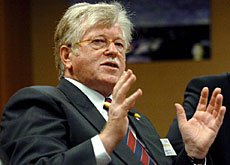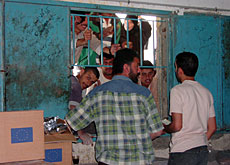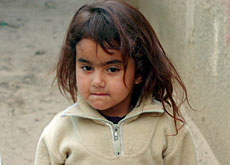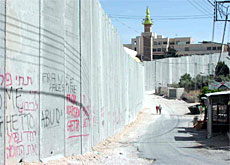Nations say they won’t abandon Palestinians

Delegates from over 90 countries and organisations have wrapped up talks in Geneva with a pledge to maintain support for the world’s 4.1 million Palestinian refugees.
In an interview with swissinfo, Switzerland’s Walter Fust, chairman of the conference, hailed the event as a success, but said that political solutions were needed too.
But he added that no amount of humanitarian aid could replace a political and peaceful resolution to the ongoing conflict in the Middle East.
The two-day conference, which ended on Tuesday, was jointly organised by the Swiss Agency for Development and Cooperation (SDC) and the United Nations Relief Works Agency (UNRWA).
According to Fust, who heads the SDC, participants touched upon a series of key issues, including the need to respect international humanitarian law, freedom of movement for refugees and access to employment opportunities.
More than $10.5 million (SFr13 million) in additional relief funds were also raised, with pledges of several million more expected in the near future from the European Commission and the United States.
swissinfo: As the host country of this conference, how does Switzerland rate its success?
Walter Fust: In my view, it was a definite success because it resulted in a clear signal that the international community is not forgetting the Palestinian refugees.
We also saw a clear commitment for further financing and we discussed the issue of responsibility, because the international community does not understand why it should compensate for what others destroy.
swissinfo: Indeed, some sceptics have questioned the point of trying to raise millions of dollars in funds for houses that might be destroyed by the Israeli military. What’s your response?
W.F.: That is really the basic question that many donors ask. But it should be noted that recently rebuilt homes have not been destroyed by Israel. The shelters that have been destroyed were old and viewed by Israel as hideouts for terrorists.
swissinfo: But at the end of the day, innocent people have also been made homeless by Israeli incursions.
W.F.: Yes, and the issue of responsibility extends to the delivery of humanitarian aid. For example, why do the Palestinians have to pay exorbitant prices for building materials, if they have access to them at all?
Why is this issue not being addressed in terms of the Geneva Conventions, which clearly stipulate that every effort should be made to facilitate the delivery of humanitarian assistance. But in this case, it’s made more difficult.
I was also impressed to see that the European Union and even the United States are firmly committed to the issue of access.
swissinfo: It’s all very well and good for the international community to make these types of pledges. But when Israel is not invited to such talks and does not make similar commitments, can events like this one really make a difference?
W.F.: This conference was about how the international community can support UNRWA in its work. Humanitarian aid cannot be a solution to the refugee issue… This must be addressed at a political level. But the answer is not for humanitarian actors to stop speaking out or to stop providing help to the victims of something we all know is illegal according to international law.
It’s not up to us to make politics and diplomacy. It’s up to us to address the issues, to find support, to contribute to solutions and to reduce the tension and hardship of such situations. So we need more humanitarian relief and more political courage within the UN to address this conflict at a very high level.
swissinfo: You seem very passionate about this issue.
W.F.: This isn’t about being passionate… This is a matter of justice and it’s also an outcry of frustration. It’s important to recognise that all parties must respect international law, and the Palestinians must accept responsibility for their actions as well.
But 50 per cent of the people living in the refugee camps are children, and they want to have a future. What future do they have if they are practically living under siege and they cannot leave or create opportunities for themselves? So I think the more we promote education, the better the chances for peace.
The bottom line is that this was not a political conference. It was about humanitarian issues… but there are no humanitarian issues without a political context.
swissinfo-interview: Anna Nelson in Geneva
During the conference, Switzerland pledged an additional SFr2 million in aid to Palestinian refugees in Jordan and Gaza.
So far this year, the Swiss have committed almost SFr20 million to UNRWA.
UNRWA was established in 1949 to provide humanitarian assistance to Palestinian refugees throughout the Middle East.
Over the past decade, the agency has been faced with the challenge of providing help to a rapidly growing number of refugees with fewer and fewer funds.

In compliance with the JTI standards
More: SWI swissinfo.ch certified by the Journalism Trust Initiative



You can find an overview of ongoing debates with our journalists here. Please join us!
If you want to start a conversation about a topic raised in this article or want to report factual errors, email us at english@swissinfo.ch.